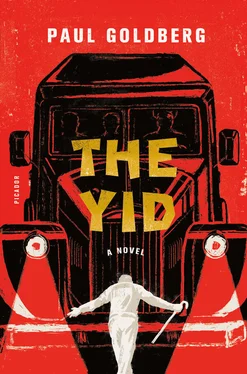The game was simple: Shimon lifted his son to his shoulders, then said with a straight face: “So, remember me?” Solomon felt his father’s big palms on his sides, then the hands parted and the child dropped down, almost to the ground, only to be caught and lifted again.
“Can you climb to my shoulders all by yourself?” his father asked, and Solomon made an honest but futile effort at jumping and climbing. Then, always unexpectedly, his father grabbed him again, usually by the hand and foot, and started a spin.
The best part was the bag. Theirs was a massive bag made out of a fishing net. Shimon must have made it himself, for such devices have no known purpose in fishing. Levinson climbed into that bag to be spun wildly. Soon after Levinson turned seven, his father stopped coming.
The boy never asked why he had lived with his aunt and uncle for as long as he could remember. And where did his mother go? He had only the dimmest memory of her: her long hair, not much else. Even her voice was a mystery.
Facts found him slowly. His father was killed while collecting money for the protection racket he ran. His mother was back in the street, entertaining sailors. The “establishment” she had kept while she was still with his father had collapsed soon after Solomon was born.
Now other men, friends of Levinson’s father, came to visit him. There were two of them, and they took turns showing up, almost always one at a time. It was part of the promise they made to his father: take care of the boy.
They threw him in the air. They spun him in the fishing net. They brought him adventure and detective books, mostly Russian translations of Walter Scott, Jules Verne, Alexander Dumas, James Fenimore Cooper, and Arthur Conan Doyle. When Levinson turned twelve, his father’s best friend, an ominous-looking Russian named Nikolai, pulled out a pistol and took him to the woods to learn to shoot. Abramovich, a tough little Jew whose first name was never used, taught him to throw knives.
They showed up together when the time came to take Levinson on his first trip to a brothel. They drank vodka downstairs as two girls not much older than Levinson instructed him in the art of love. When Levinson gingerly stepped down the stairs, his father’s friends applauded, then handed him a glass of vodka.
These men became his real family. They replaced his father in reminding him who he was and teaching him the tricks of survival. The uncle and aunt were mere caretakers. He formed no bond with them. When they left for America, expecting that the young man would come along, Levinson got as far as the seaport. At the gate, he turned around and ran. He thought he would be able to join his father’s gang, but the gang kept him out, and he moved from one family of gang members to another, toting the books in the bag his father had made for the purpose of making him airborne.
He doesn’t need to wonder where these people are now. Nikolai died somewhere in Kolyma, the gold mines, most likely. Abramovich, by then a cripple, was hanged by the Nazis when they occupied Odessa. His mother he knows nothing about, and wouldn’t care to inquire, even if anyone knows.
As he awakens at Kogan’s dacha, Levinson thinks of that bag. It was in his satchel when he joined the Red Army in 1918. It was lost somewhere, of course, probably at the hospital. That morning, Levinson thinks of his father’s gang. He thinks of his band of partisans, of his ensemble of actors in that shrapnel-battered Fordik . And he thinks of the leap that made him famous.
His fate is to rely on others. His fate is to lead. His fate is to prevail.
* * *
Warmth and the smell of burning oak radiate from the stove in the center of Kogan’s dacha.
Lewis’s pillow is up against the stove, his eyes fixed on the light. Bookshelves occupy every square centimeter of wall space. Lewis has never seen so many books in anyone’s house before. Many are thin tomes of poetry, published in small runs, four thousand or less, treasures that lesser men than Kogan used to heat their houses during the war.
That morning, as he dozes off on his cot, Lewis doesn’t have a chance to appreciate the cot’s construction. Made from old wooden beams and clamped with heavy bolts, it flaunts its seams and its simple, honest joints.
Pulling on the sheepskin overcoat that served as his blanket during the night, he follows the sound of agitated voices.
Outside, two coatless old men are trying to hit each other with saber-sized sticks.
“Paskudnyak!” shouts Kogan. A low-life!
A short, thin, balding man, he is twirling a stick, like a horseless Cossack on a death-defying charge.
“ An alte tsig bist du,” says Levinson calmly. You are an old goat.
With a deft blow, he sends Kogan’s weapon flying into the snow.
“An alte tsig?” repeats Kogan, looking for his weapon. “ I am a respected fifty-eight-year-old physician, and he says an alte tsig ?”
“You fight like a tsig. Zuskin in a dress could fight better than that.”
“Zuskin didn’t fight in a dress. He danced in a dress,” says Kogan. “And it’s been thirty-five years since your Red Army.”
“You fought like a young goat then, you fight like an old goat now. Once a goat, always a goat.”
“Tell that to the dead Cossacks!” shouts Kogan, pulling the stick out of the snow.
Holding the stick with both hands, he charges Levinson in a desperate attempt to pierce him like a kebab.
“Feh!” says Levinson, deflecting the charge.
“Vos? Dray Moshketiren shpiln?” asks Lewis in Yiddish. What? Playing Three Musketeers?
“And what are you playing, mister? Uncle Tom’s Cabin ?” responds Levinson.
“Fuck you,” says Lewis in English, setting off reverberations of “fok yu” from Levinson and Kogan.
* * *
It would be tempting to surmise that Kogan’s wartime spree of murder was the consequence of a childhood rife with violence, ignorance, and deprivation. This would be wrong. Kogan’s father was an exporter of Russian wheat and lumber. His given name was Samuil. He changed it to the Russian-sounding Sergei, but the last name — Kogan — remained.
His holdings included freighters that docked in Odessa. The family lived in a seaside mansion. The Kogans were among founders of a Reform temple, but even as president of that temple, Sergei showed up only on High Holidays. Violin was the only instrument Aleksandr Sergeyevich played before he learned to operate a machine gun. He was, likely, one of the few men in history to move on from Stradivarius to Maxim.
Sergei Kogan didn’t have a beard. He remembered Yiddish reasonably well, despite his efforts not to. His dream was to enlighten his brethren, to make them equivalent to other ethnic and religious groups. When his daughter declared her intention to marry a Dane, Sergei didn’t go into mourning. He blessed the union.
Russian, German, and French were the languages spoken at the Kogan house. Sasha’s Yiddish was somewhere between poor and nonexistent, but the amalgamation of German and Russian, brought to life by shreds of conversation he heard in the Odessa streets, allowed him to stumble through.
On occasion, pogroms flared up in Odessa, but the Kogan house was safe. The gendarmes were posted at its gates at the first sign of disturbance. The governor general was a friend, as was the entire bureaucracy that ran the seaport.
Sergei didn’t try to dissuade Aleksandr as he gravitated toward radical groups at the gymnasium. Enlightenment is a journey, and Sergei didn’t believe he had any authority to interfere.
Aleksandr read Marx tome by tome, saw the progression of his thought, but was mostly touched by early Marx, specifically The Economic and Philosophic Manuscripts of 1844, a work that describes the theory of man’s alienation in capitalist society. This construct was harmonious with the ideas Aleksandr had gleaned from the classics of Russian literature, his other, bigger obsession.
Читать дальше












